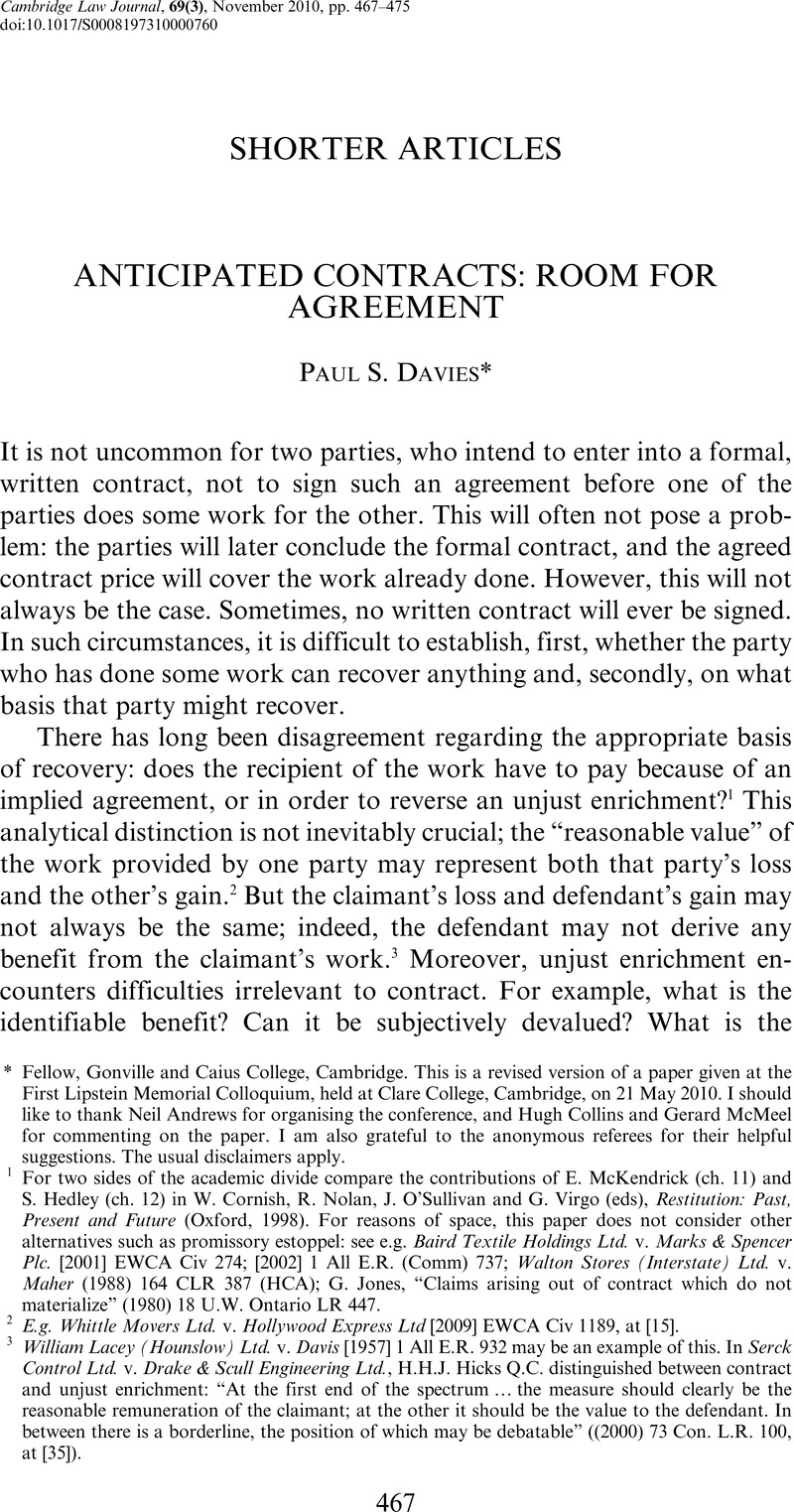Published online by Cambridge University Press: 12 November 2010

1 For two sides of the academic divide compare the contributions of E. McKendrick (ch. 11) and S. Hedley (ch. 12) in W. Cornish, R. Nolan, J. O'Sullivan and G. Virgo (eds), Restitution: Past, Present and Future (Oxford, 1998). For reasons of space, this paper does not consider other alternatives such as promissory estoppel: see e.g. Baird Textile Holdings Ltd. v. Marks & Spencer Plc. [2001] EWCA Civ 274; [2002] 1 All E.R. (Comm) 737; Walton Stores (Interstate) Ltd. v. Maher (1988) 164 CLR 387 (HCA); G. Jones, “Claims arising out of contract which do not materialize” (1980) 18 U.W. Ontario LR 447.
2 E.g. Whittle Movers Ltd. v. Hollywood Express Ltd [2009] EWCA Civ 1189, at [15].
3 William Lacey (Hounslow) Ltd. v. Davis [1957] 1 All E.R. 932 may be an example of this. In Serck Control Ltd. v. Drake & Scull Engineering Ltd., H.H.J. Hicks Q.C. distinguished between contract and unjust enrichment: “At the first end of the spectrum … the measure should clearly be the reasonable remuneration of the claimant; at the other it should be the value to the defendant. In between there is a borderline, the position of which may be debatable” ((2000) 73 Con. L.R. 100, at [35]).
4 [2009] EWCA Civ 1189.
5 [2009] EWCA Civ 26; [2009] 2 All E.R. (Comm) 542.
6 Albeit not on the same terms as the first instance judge had thought: [2010] UKSC 14, [2010] 1 W.L.R.753.
7 Pan Ocean Shipping Co. Ltd. v. Creditcorp Ltd. (The Trident Beauty) [1994] 1 W.L.R.161.
8 E.g. Yeoman's Row Management Ltd. v. Cobbe [2008] UKHL 55; [2008] 1 W.L.R.1752. The speech of Lord Scott is not free from difficulty. For example, was Cobbe not a risk-taker by doing work without the protection of a contract? The decision might be better explained on the basis of a “collateral” contract, into which a term that a reasonable price be paid was implied.
9 See, e.g., G. Virgo, Principles of the Law of Restitution, 2nd ed. (Oxford 2006) pp. 306–308; Roxborough v. Rothmans of Pall Mall Ltd. (2001) 208 CLR 516 (HCA).
10 Stephen Donald Architects Ltd. v. King [2003] EWHC 1867 (TCC), at [79], per H.H.J. Richard Seymour Q.C.
11 Müller [2010] UKSC 14, [2010] 1 W.L.R.753, at [1].
12 “[I]f it is nannyish to impose liability in contract, then it is nannyish to impose it in restitution”: Hedley op. cit. p. 196.
13 [1984] 1 All E.R. 504.
14 Mamidoil-Jetoil Greek Petroleum Company S.A. v. Okta Crude Oil Refinery A.D. [2001] EWCA Civ 406; [2001] 2 All E.R. (Comm) 193, at [69]; Whittle, op. cit.; Müller op. cit.
15 Cf. Hedley, op. cit., p. 197.
16 G Percy Trentham Ltd. v. Archital Luxfer Ltd. [1993] 1 Lloyd's Rep. 25, 27. In Pagnan SPA v. Feed Products Ltd. [1987] 2 Lloyd's Rep. 601, 619, Lloyd L.J. explained that a term would only be truly “essential” if the contract would be incomplete and therefore unenforceable without it, and continued: “Of course the more important the term is the less likely it is that the parties will have left it for future decision. But there is no legal obstacle which stands in the way of the parties agreeing to be bound now while deferring important matters to be agreed later”. This was cited with approval by the Supreme Court in Müller, op. cit., at [49].
17 [1989] 1 Lloyd's Rep. 213, 224.
18 [2009] EWCA Civ 1189. This case is considered in more detail at (2010) 126 L.Q.R. 175.
19 Ibid., at [45].
20 Dinkha Latchin v. General Mediterranean Holdings S.A. [2003] EWCA Civ 1786, at [20]-[23].
21 In Whittle, the trial judge accepted that the price of the interim contract was the same as that envisaged under the longer-term contract, but it may have been more appropriate to imply a term that a reasonable price be paid in the context of the shorter-term agreement, using the Supply of Goods and Services Act 1982, s.15. A contract can be formed despite the price not being expressly agreed: Foley v. Classique Coaches [1934] 2 KB 1.
22 [1993] 1 Lloyd's Rep. 25, 27.
23 [2001] EWCA Civ 406; [2001] 2 All E.R. (Comm) 193, at [69].
24 [2010] UKSC 14, [2010] 1 W.L.R.753, at [63]. The Justices clearly thought it unlikely that performance would not be based on detailed terms: Ibid., at [9].
25 Ibid., at [58].
26 Ibid., at [43].
27 The Supreme Court thought it “inconceivable” that the parties would have agreed only some of the terms, but not the MF/1 terms: Ibid., at [63].
28 Ibid., at [31].
29 G. Treitel, The Law of Contract, 12th ed., by E. Peel (London 2007), para. 4-006. See too Confetti Records (A Firm) v. Warner Music UK Ltd. [2003] EWHC 1274 (Ch), [2003] E.M.L.R. 35, at [62]–[112] (Lewison J.).
30 Müller, op.cit., at [86]–[88].
31 Ibid., at [86].
32 E.g. Regalian Properties plc. v. London Docklands Development Corp. [1995] 1 W.L.R. 212.
33 Müller, op. cit., at [87].
34 Ibid., at [47].
35 Ibid., at [54].
36 Countrywide Communications Ltd. v. ICL Pathway Ltd. [2000] C.L.C. 324, 349.
37 Stocznia Gdanska SA v. Latvian Shipping Co. [1998] 1 W.L.R. 574.
38 Westdeutsche Landesbank Girozentrale v. Islington London Borough Council [1996] A.C. 669, 682 (Lord Goff); Birks, ‘Failure of Consideration’ in F. Rose (ed.) Consensus Ad Idem (London 1996).
39 It is suggested that a remedy will only be desirable where a contract can legitimately be found. This is unlikely to be the case if the claimant has simply done what would normally be done in the hope of concluding a contract. See, e.g., William Lacey (Hounslow) Ltd. v. Davis [1957] 1 All E.R. 932.
40 Müller, op. cit., at [1].